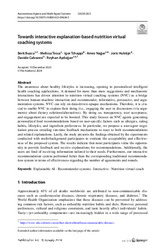Towards interactive explanation-based nutrition virtual coaching systems
| dc.contributor.author | Buzcu, Berk | |
| dc.contributor.author | Tessa, M. | |
| dc.contributor.author | Tchappi, I. | |
| dc.contributor.author | Najjar, A. | |
| dc.contributor.author | Hulstijn, J. | |
| dc.contributor.author | Calvaresi, D. | |
| dc.contributor.author | Aydoğan, Reyhan | |
| dc.date.accessioned | 2024-02-24T19:37:23Z | |
| dc.date.available | 2024-02-24T19:37:23Z | |
| dc.date.issued | 2024-01 | |
| dc.identifier.issn | 1387-2532 | en_US |
| dc.identifier.uri | http://hdl.handle.net/10679/9211 | |
| dc.identifier.uri | https://link.springer.com/article/10.1007/s10458-023-09634-5 | |
| dc.description.abstract | The awareness about healthy lifestyles is increasing, opening to personalized intelligent health coaching applications. A demand for more than mere suggestions and mechanistic interactions has driven attention to nutrition virtual coaching systems (NVC) as a bridge between human–machine interaction and recommender, informative, persuasive, and argumentation systems. NVC can rely on data-driven opaque mechanisms. Therefore, it is crucial to enable NVC to explain their doing (i.e., engaging the user in discussions (via arguments) about dietary solutions/alternatives). By doing so, transparency, user acceptance, and engagement are expected to be boosted. This study focuses on NVC agents generating personalized food recommendations based on user-specific factors such as allergies, eating habits, lifestyles, and ingredient preferences. In particular, we propose a user-agent negotiation process entailing run-time feedback mechanisms to react to both recommendations and related explanations. Lastly, the study presents the findings obtained by the experiments conducted with multi-background participants to evaluate the acceptability and effectiveness of the proposed system. The results indicate that most participants value the opportunity to provide feedback and receive explanations for recommendations. Additionally, the users are fond of receiving information tailored to their needs. Furthermore, our interactive recommendation system performed better than the corresponding traditional recommendation system in terms of effectiveness regarding the number of agreements and rounds. | en_US |
| dc.description.sponsorship | University of Applied Sciences and Arts Western Switzerland (HES-SO) ; CHIST-ERAgrant ; Swiss National Science Foundation (SNSF) ; Ministry of Education, Universities and Research (MIUR) ; Luxembourg National Research Fund ; TÜBİTAK | |
| dc.language.iso | eng | en_US |
| dc.publisher | Springer | en_US |
| dc.relation | info:turkey/grantAgreement/TUBITAK/120N680 | |
| dc.relation.ispartof | Autonomous Agents and Multi-Agent Systems | |
| dc.rights | openAccess | |
| dc.rights | Attribution 4.0 International | |
| dc.rights.uri | https://creativecommons.org/licenses/by/4.0/ | |
| dc.title | Towards interactive explanation-based nutrition virtual coaching systems | en_US |
| dc.type | Article | en_US |
| dc.description.version | Publisher version | en_US |
| dc.peerreviewed | yes | en_US |
| dc.publicationstatus | Published | en_US |
| dc.contributor.department | Özyeğin University | |
| dc.contributor.authorID | (ORCID 0000-0002-5260-9999 & YÖK ID 145578) Aydoğan, Reyhan | |
| dc.contributor.ozuauthor | Aydoğan, Reyhan | |
| dc.identifier.volume | 38 | en_US |
| dc.identifier.issue | 1 | en_US |
| dc.identifier.wos | WOS:001145051900001 | |
| dc.identifier.doi | 10.1007/s10458-023-09634-5 | en_US |
| dc.subject.keywords | Explainable AI | en_US |
| dc.subject.keywords | Interactive | en_US |
| dc.subject.keywords | Nutrition virtual coach | en_US |
| dc.subject.keywords | Recommender systems | en_US |
| dc.identifier.scopus | SCOPUS:2-s2.0-85182718660 | |
| dc.contributor.ozugradstudent | Buzcu, Berk | |
| dc.relation.publicationcategory | Article - International Refereed Journal - Institutional Academic Staff and Graduate Student |
Files in this item
This item appears in the following Collection(s)
Share this page




